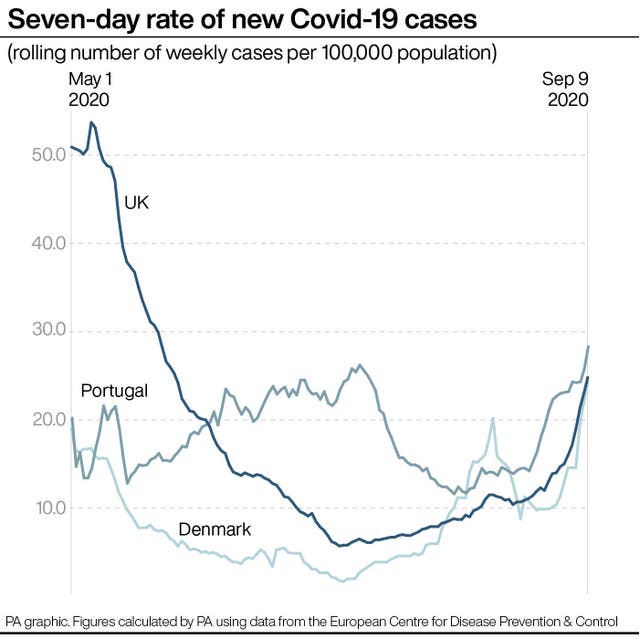Matt Hancock defends Operation Moonshot amid laughter from MPs
Earlier on Thursday a leading statistician warned that hundreds of thousands of people could be unnecessarily told to isolate under the proposals.

The Health Secretary has defended the Government’s ambitious mass Covid-19 testing proposals in the face of laughter and heckling in Parliament.
Matt Hancock hit out at the “naysayers” in the House of Commons when outlining the “Operation Moonshot” plans, which would see millions of UK-wide tests carried out daily.
Earlier on Thursday a leading statistician warned that hundreds of thousands of people could be unnecessarily told to isolate under the proposals.
But Mr Hancock said he is “absolutely determined that we will get there” and is looking forward to rolling out the programme, which will aim to provide mass testing using saliva and other methods which can deliver results within 20 to 90 minutes.
He explained that the approach is being piloted and steps are being taken to verify the new technology ahead of a desired nationwide roll-out.
Amid heckling, he told MPs: “I’ve heard the naysayers before and I’ve heard the people on the other side complain we’ll never get testing going – and they’re the same old voices.”
He added: “I’m looking forward to rolling out this programme and this work, which has been under way for some time already, I’m absolutely determined that we will get there.
“And if everything comes together, and if the technology comes off, it’ll be possible even for challenging sectors like theatres to get closer to normal before Christmas.”

Professor Sir David Spiegelhalter said the “huge danger” with the project – which would see millions of UK-wide tests carried out daily – was that there would be a “very large number of false positives”.
His warning came as Transport Secretary Grant Shapps admitted the technology for the plan does not yet exist, saying that while the Government was hoping to develop a test that provided a result in the much shorter timeframe, there “isn’t a certified test in the world that does this”.
Prof Spiegelhalter told BBC Radio 4’s Today programme that statisticians were “banging their heads on the wall” at the proposal.
“Mass screening always seems like a good idea in any disease – ‘Oh yes, let’s test everybody’. But the huge danger is false positives – no tests are perfect, it is not a simple yes/no thing.”
He said the threshold would have to be set to a level that would “pick up anything that hints at being infectious”, meaning that the tests would “always generate a very large number of false positives”.
Mr Johnson told a Downing Street press conference on Wednesday that the mass testing scheme could help sport and entertainment venues reopen fully and allow people to socially mix in large groups again with on-the-day tests.

Leaked documents seen by the BMJ medical journal suggested the project could have a price tag of £100 billion – close to that of the £114 billion budget given to NHS England in 2018/19.
Shadow health secretary Jonathan Ashworth criticised the Government over “undelivered promises” on its testing system for the virus.
He told the Commons: “We are all fed up of undelivered promises. Mass testing is too important to become another failed project.
“It’s all well and good (Matt Hancock) talking about moonshots and the Prime Minister telling us we’ll be tested every morning, even better would be simply delivering the extra testing that is needed now, not just headline figures.”
The current system in England has been under pressure, with a senior official at NHS Test and Trace issuing an apology earlier this week to people unable to get a test, saying that laboratories processing tests are at a “critical pinch-point”.

Mr Hancock told MPs: “We’ve increased capacity by over 10,000 tests a day over the last fortnight and while there have been challenges in access to tests, the vast majority of people get their tests rapidly and close to home.”
His remarks came as the number of close contacts of people who tested positive for Covid-19 in England reached through the Test and Trace system fell to its lowest since the system was launched.
Just over two thirds (69.2%) of close contacts were reached in the week ending September 2, down slightly from 69.8% in the previous week, and once again short of the Government’s 80% target.
The figures from the Department of Health and Social Care also showed that the system recorded the highest weekly number of positive tests since it was launched at the end of May.
The 24-hour turnaround target for people receiving results after being tested at a regional site or mobile testing unit – a so-called “in-person” test – was also missed, with just 61.9% of people getting their result within that timeframe.
With positive cases on the rise, new rules from Monday will outlaw social gatherings of more than six people in England.
On Thursday Scotland’s First Minister Nicola Sturgeon announced social gatherings there will be limited to groups of six from two households, both indoors and outdoors.
Meanwhile Professor Neil Ferguson, whose modelling led to the decision to impose the lockdown in March, said people should “hesitate” at the “headlong rush to get everybody back into offices” amid the rising cases.
“The case number increases we’ve seen in the last two weeks do not yet account for the reopening of schools.
“So undoubtedly that may increase transmission still further and there may be a need therefore to reduce contacts in other settings,” he told Today.





